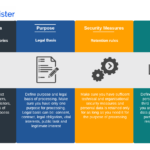In this article, we will introduce you to some useful GDPR software tools which may help you reach GDPR compliance and maintain it. We will focus on tools that are easy to implement, most are free or have very reasonable pricing levels. You may already have access to some of the software tools within your current software stack and just need to make use of them. We have also included a list of best practices and tips that should be considered when building your own toolkit.
Table of Contents
First things first: what is GDPR?
What is GDPR compliance software?
Principles of GDPR you should know before choosing the software
Lawfulness, fairness and transparency
This principle requires that all organisations must ensure that any processing activities comply with applicable laws and regulations. In other words, if you process people’s personal data, you must ensure that you follow the rules set by the legislation.
The main components of this principle are:
- Demonstrating a lawful basis for obtaining and processing personal data. GDPR defines six lawful bases: consent, the performance of a contract, legitimate interest, vital interests, legal requirement and public interest. You can read more on lawful bases in our article here.
- The collection of personal data must be conducted in a fair manner. Fair means that the way in which data is collected must be transparent and fully explainable to the person who provides his/her personal data.
- Transparency means that an individual must always be informed whether he/she is being asked to provide his/her personal data. The “right to be informed” is a core element of this principle. Examples of transparency principles could be privacy policies and notices located on your website, cookie policy and other documents providing the data subjects with a clear understanding of how personal data is being collected and processed.
Purpose limitation
Data minimisation
Accuracy
Storage limitation
Integrity and confidentiality (security)
Accountability
- Records of Processing Activities;
- Personal Data Protection Policy;
- Privacy Notices (for employees, website visitors, etc.);
- Data Processing Agreements signed with your service providers;
- Data Retention Policy and schedules;
- Consent forms;
- Data breach response and notification procedures;
- Data Breach register;
- Data subject request processing procedures;
- Data Protection Impact Assessments;
- Legitimate Interest Assessments;
- Vendor Assessments;
- Data Transfer Impact Assessments.
GDPR compliance software
GDPR audit tools
ICO data protection self-assessment
- small business owners and sole traders checklist;
- data protection assurance checklists for controller and processor;
- information security checklist;
- direct marketing checklist;
- records management checklist;
- CCTV compliance checklist.
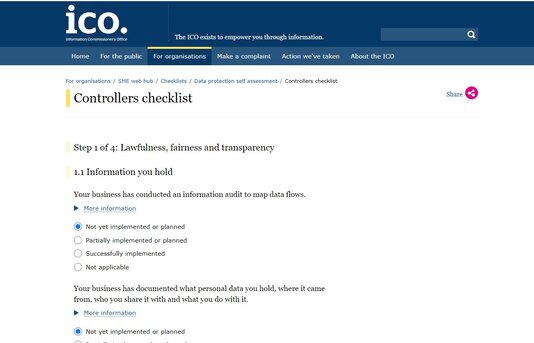
- accountability governance;
- processing principles;
- privacy by design and default;
- data protection impact assessment;
- records of processing;
- data subject rights;
- consent and notices;
- breach management;
- processors;
- data transfers.
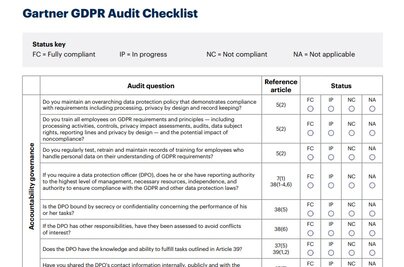
GDPR Register allows performing personal data mapping and maintaining records of processing activities, which will include the most essential information about your personal data, purposes of the processing, lawful bases, incident management and much more. It’s suitable both for a small companies and has advanced features much needed by multi-national corporations. It is a GDPR compliance solution that does not require any complicated setup and saves time by providing professional templates for different types of records and documents.
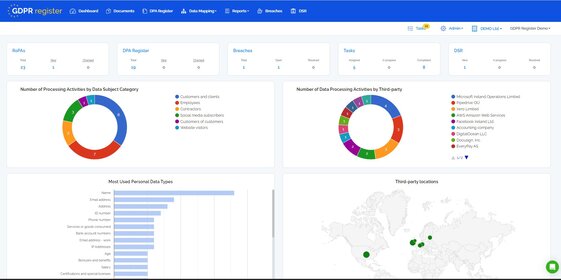
Read more about the benefits of GDPR Register’s software tool
Consent management tools
CookieHub
CookieHub is a simple and cost-effective GDPR compliance tool for cookie consent management. Includes cookie scanner, consent management, cookie blocker, customisable user interface, multiple languages and cookie summary information. The cookie declaration can be easily integrated into your cookie policy allowing you constantly keep the cookie information up to date.
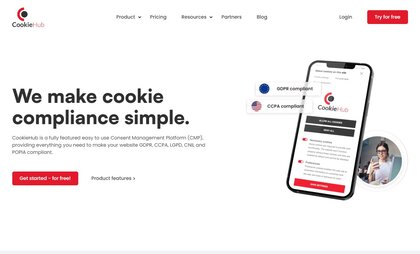
Learn more about CookieHub’s GDPR compliance software.
Privacy policy generators
- pre-built assessment tool
- risk assessments and compliance score
- guidance
- data classification
- data control
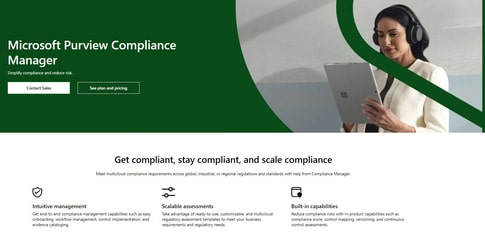
Azure Information Protection
GDPR Compliance software for data minimisation, accuracy, storage limitation and security principles
Microsoft Purview Compliance Manager
- enforce data minimisation and storage limitations;
- perform data classification based on the sensitivity level of the data;
- identify sensitive data and protect it accordingly;
- automatically delete sensitive data after a certain period of time;
- protect your data against accidental disclosure;
- detect unauthorized access attempts;
- monitor changes made to your data.
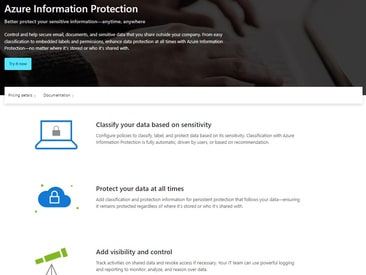
Amazon Macie

- identify sensitive data;
- protect it automatically;
- delete sensitive data after a specified retention period;
- block unwanted access to sensitive data;
- prevent unauthorized disclosure of sensitive data;
- detect and prevent malicious activity.
ARX Data Anonymization Tool
- Removal of personally identifiable information such as names, addresses, phone numbers, etc.
- Reduction of PII to non-personally identifiable information ;
- Replacement of PII with non-PII;
- Replace PII with random strings or other unique identifiers;
- Generation of synthetic data sets.
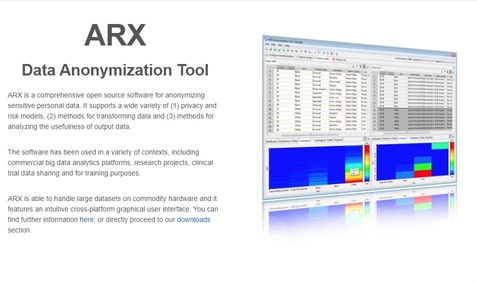
Learn more about ARX Data Anonymization Tool.
Software for technical security measures
The security software subject is a completely separate one and it’s not an aim of this article to cover this. Here we will bring some important types of security software that you may consider looking at to improve the protection of personal data in your organisation.
Here is the list of various types of security software types that may give your organisation the protection it needs:
- anonymistation and pseudonymisation;
- encryption;
- endpoint security;
- anti-spyware;
- anti-malware;
- network security;
- email security;
- firewalls;
- password managers;
- encryption software;
- log management software;
- monitoring tools;
- intrusion prevention software;
- bot protection;
- internet of things (IoT) security.
It is worth consulting with your IT department to find the best suitable security tools for your organisation.
Software for organisational security measures
There are also organisational security measures that have to be considered when talking about the security of personal data. According to a research Psychology of Human Error performed by Stanford University Professor Jeff Hancock and security firm Tessian, nine of 10 (88%) data breach incidents are caused by employees’ mistakes.
Organisational security measures shall include:
- audits and reviews;
- awareness and training of employees;
- information security policies;
- business continuity plan;
- risk assessments;
- vendor assessments.
GDPR compliance software for accountability principle
GDPR Register
- Templates for all required documents above;
- Records of processing activities;
- Register of data processing agreements and agreement templates;
- Breach register and incident management;
- Registry for Data Subject Requests;
- Data retention rules;
- Plenty of reporting and exporting tools;
- Task management and other collaboration tools features for your team;
- Complex organisation structure management and information scaling through the group.







